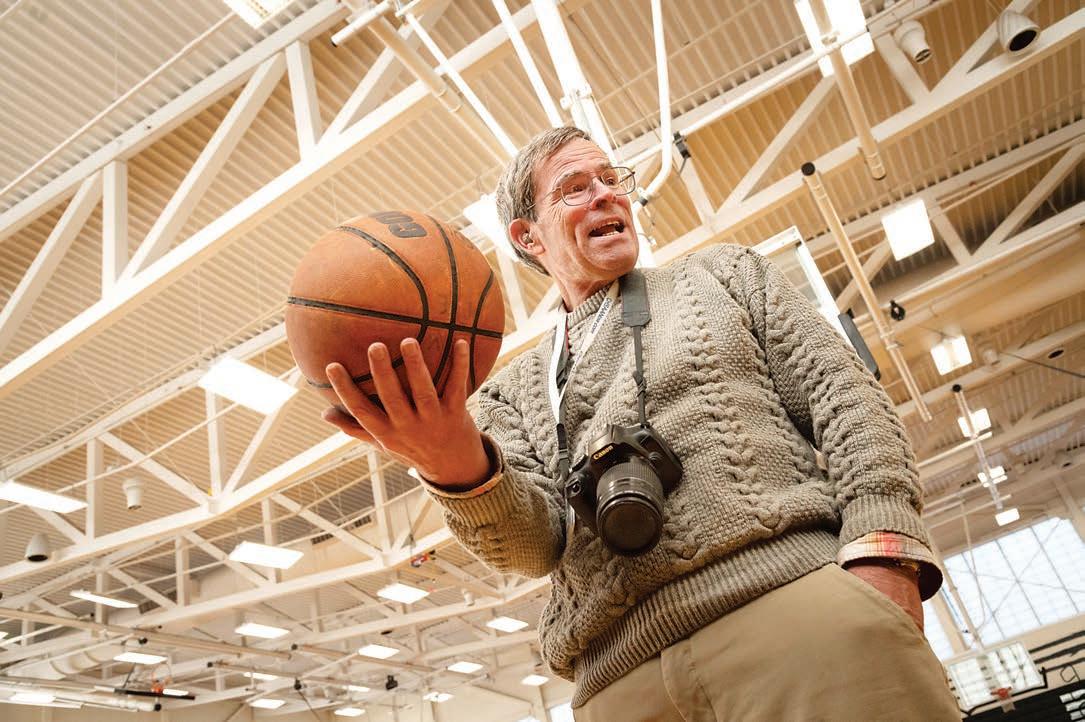
3 minute read
Front Range oil and gas emissions are the targets of legislation
BY SAM BRASCH COLORADO PUBLIC RADIO
Colorado lawmakers are set to propose new legislation to better understand and regulate the oil and gas industry’s contribution to ozone pollution along the Front Range.
e announcement came during a Feb. 21 event at the state Capitol arranged by the Colorado Public Interest Research Group and Colorado Mountain Mamas to call for new policies to address the persistent pollution problem. e groups timed the event to take place 100 days before the start of the next ozone season.
At the press conference, state Rep. Jennifer Bacon, a Democrat from Denver, said one potential solution is to give air regulators more oversight over new oil and gas drilling.
Together with fellow Democratic state Rep. Jenny Willford of Northglenn, she plans to introduce a bill in the coming weeks that would require the state to estimate the impact of every proposed drilling plan — and only approve projects that won’t exacerbate local air pollution problems.
“We have to be sure that before they operate, we understand what kind of impact they’re going to have on our air quality,” Bacon said.
e upcoming proposal would be the latest attempt to tackle one of the region’s toughest air quality issues.
Ground-level ozone is a wellstudied lung irritant associated with heart attacks, childhood asthma and premature death. It blankets the
Front Range each summer when two categories of pollutants — nitrogen oxides and hydrocarbons — react in the atmosphere amid heat and sunlight.
While a majority of the pollution blows in from outside Colorado’s borders, state data suggests local emissions sources push concentrations above permissible levels set by the federal government. e World Health Organization has recommended even lower health standards for ground-level ozone.
New data suggests oil and gas operations play the largest role of any local emissions source along the Front Range. Last year, Colorado air regulators revealed an error had led them to vastly underestimate the impact of drilling and hydraulic fracturing. eir revised modeling showed those two activities alone will likely add more critical ozonecausing pollutants than every car and truck along the Front Range.
Oil and gas groups dispute the new estimates, saying they’re based on a awed analysis of industry data.
What isn’t up for debate are ozone readings at local monitors. e results have drawn increased scrutiny from the U.S. Environmental Protection Agency, which reclassi ed the Front Range as a “severe” ozone violator last year. e American Lung Association also ranks Metro Denver as the seventh worst U.S. city for ground-level ozone pollution. e upcoming legislation will likely meet erce resistance from the oil and gas industry.
A version of a similar bill never managed to reach the oor of the state House or Senate last year. e Denver Business Journal reported former Democratic state Rep. Tracey Bernett dropped her e orts after oil and gas representatives claimed the plan could devastate an industry already facing strict regulations.
Oil and gas representatives appear ready to sound the alarm again this year. Lynn Granger, the midwest and mountain west director of the American Petroleum Institute, said the bill sponsors had yet to share a draft of the legislation, but they oated key concepts at a meeting on Monday.
“As described, the bill would functionally end new permitting for natural gas and oil development in Colorado’s highest-producing basin by 2024,” Granger said. “ e proposal should be a non-starter for Coloradans who have spent the last year su ering from high energy prices at home and at the pump.” ose warnings echo a bitter ght over oil and gas regulations in 2019. During the legislative session that year, Colorado Democrats proposed SB-181, which gave local governments far larger role in the permitting process and redirected state oil and gas regulators to protect health and safety.
Gov. Polis signed the bill despite the opposition campaign.
Under the current system, a company planning to drill new wells must obtain a construction permit from the Colorado Oil and Gas Conservation Commission. e panel approved 4,663 new well permits be- tween 2019 and 2022, which means the state has continued to greenlight drilling under the process reformed by SB-181.
A company works on a parallel track to obtain an air quality permit from the Colorado Air Pollution Control Division. Federal law requires those regulators to run computer models to determine the potential impact on local air quality.
Colorado has landed in hot water for failing to complete those modeling e orts in the past. In a report last year, the EPA con rmed claims from whistleblowers who said the division had issued permits without a proper evaluation.
Rep. Bacon said her legislation would clarify that the state must complete those estimates. In addition, it would consolidate the process to attain a drilling permit and an air quality permit. By forcing more coordination between regulators, she added, many companies could nd new “e ciencies.”
Bacon nevertheless said the state must also nd a way to account for smaller sources of air pollution, which combine to create “cumulative impacts” that put the health of Colorado residents at risk.
“We will have to put our foot down and say what is contributing to our poor air quality,” Bacon said. “It is our lack of accounting from what’s happening from these minor sources.” is story is from CPR News, a nonpro t news source. Used by permission. For more, and to support Colorado Public Radio, visit cpr.org.








